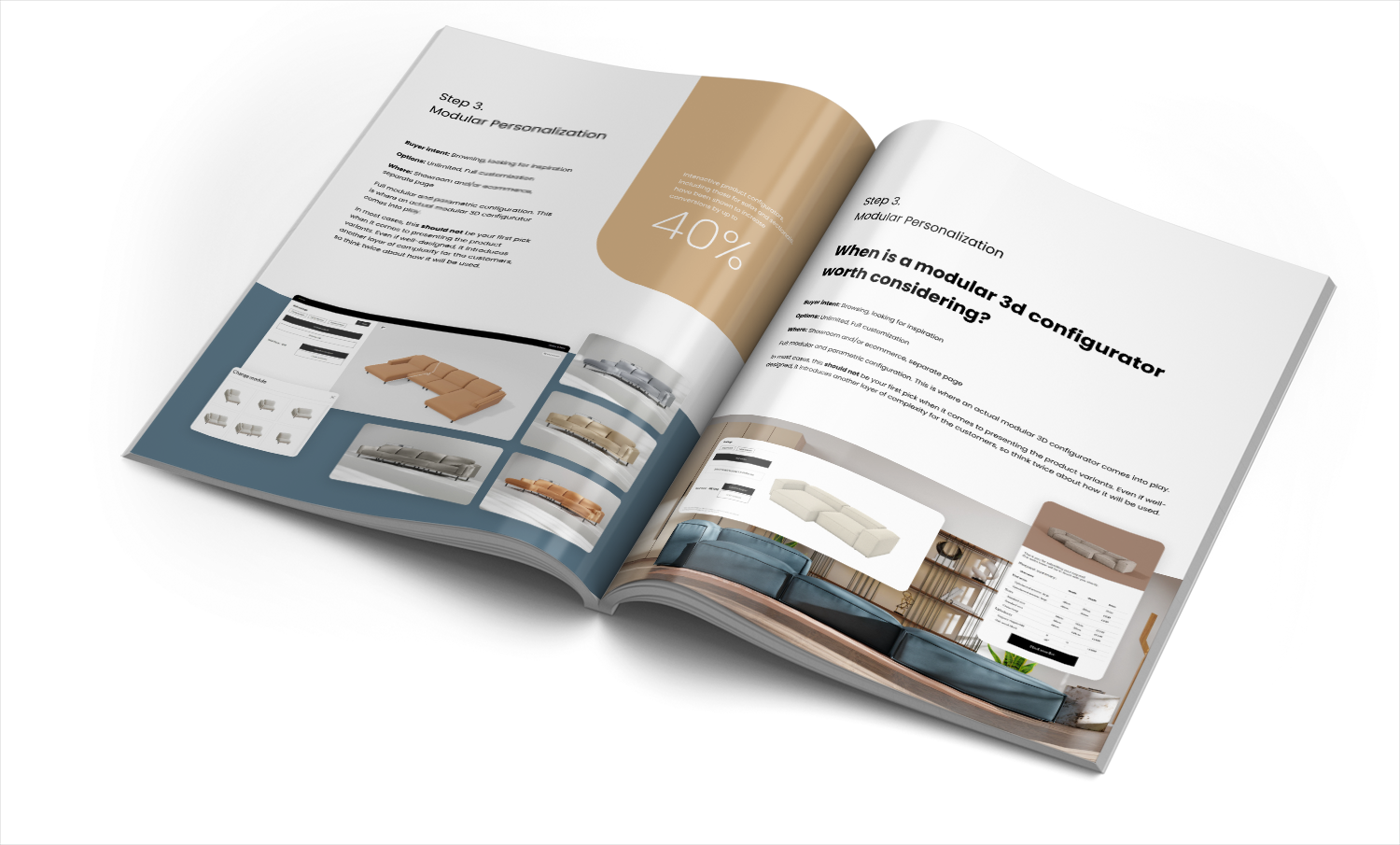The Ultimate 2025 Sofa Configuration Guide
Get your free copy todayy!

Content markdown: Furniture brands eager to boost sales often make a critical misstep: investing in a “cool” 3D configurator without first clarifying what job it’s meant to perform in the sales process. The costliest error isn’t a technical one—it’s deploying the wrong configurator for your funnel, which leads to wasted resources, frustrated teams, and missed revenue. Here’s how to avoid this trap, clarifying which configurator type truly fits each stage of your sales funnel for maximum impact.
Sales reps routinely get bogged down chasing unqualified leads—endless calls, half-hearted showroom visits, and quotes for customers who simply aren’t ready to buy. All this drains sales bandwidth, inflates acquisition costs, and eats into profitability.
A lead pre-qualifier configurator sits at the top of your funnel, letting prospects explore layouts, pricing, and material options on their own before ever contacting your team. This layer filters out browsers and price-checkers, ensuring that only serious, educated leads reach your reps. For example, custom kitchen manufacturers using pre-qualifier tools report a 40% drop in wasted quoting time and a 30% increase in conversion from lead to close. Integrating this configurator with your CRM captures key preferences and budgets up front, supercharging lead quality. Learn how a pre-quote configurator transforms quoting efficiency and lead quality and how to qualify leads better using configurators.
Showrooms can overwhelm buyers with paper catalogs, disconnected swatches, and static displays. Customers hesitate, unable to visualize complex or modular options. Sales cycles stretch out, with repeated visits and slow quote generation.
A dual-purpose 3D CPQ (Configure Price Quote) configurator transforms the showroom into an interactive, high-conversion environment. Your reps can mix tactile swatches with real-time 3D visualization, providing visual confidence and immediate price clarity. This kind of setup shortens the decision cycle, increases attachment rate on upgrades, and preserves margin through data-driven pricing logic—directly linking materials selected to yield-optimized discounts. Brands using showroom companion tools see a 15–20% boost in in-store conversions and sharper upselling performance. Discover how showroom technology boosts perceived professionalism and how to use the configurator in client meetings for higher engagement and faster closing. Optimize showroom configurator experiences by understanding when you need WebGL for in-store configurators and how to train your team effectively to use the configurator.
Lower-ticket items, like chairs or tables, see plenty of web traffic but low online conversion rates. Shoppers can’t easily price and purchase customized versions, so they drop off, uncertain about final cost and lead times.
Here, a full self-service configurator that enables real-time pricing, variant selection, and instant checkout is critical. For these products—where customers expect Amazon-like ease—the checkout accelerator bridges the experience gap. It integrates directly with your e-commerce and ERP platforms, pulling stock, delivery, and pricing data for an accurate transactional flow. Furniture brands using this model have measured up to a 2x increase in revenue per visitor, and a measurable drop in cart abandonment. Learn strategies to reduce cart abandonment with configurators and how to integrate configurators with your online store. Understand the critical importance of instant pricing transparency for e-commerce success and how to use visualization to build trust and improve online conversions.
Many brands lack usable buyer data from digital channels—missing chances for remarketing, cross-sales, and personalized communication. Marketing teams are left with generic campaigns and poor ROI.
A configurator doesn’t just close sales—it should actively generate qualified leads and usable content. By embedding save/share functions, you capture user data, power remarketing campaigns, and fuel CRM-driven follow-ups. Some brands leverage AR/3D previews emailed to leads or direct to landing pages, doubling their engagement rates. Integration with CMS and marketing automation tools ensures every interaction can trigger tailored communication or outreach. Unlock the potential of configurator visuals as dynamic marketing content by learning how to generate marketing visuals from configurator data and seamlessly turn sessions into personalized follow-ups with CRM integration. Also, explore how to use configurator analytics to improve marketing campaigns for more targeted, effective outreach.
| Funnel Stage | Pain Point | Configurator Type | Key Integrations | Expected Impact |
|---|---|---|---|---|
| Lead Generation | Low-quality leads | Lead Pre-Qualifier | CRM | Fewer wasted quotes, higher win rate |
| Discovery/In-Store | Decision friction | 3D CPQ Showroom Companion | ERP, CAD/nesting, CRM | Shorter cycles, higher conversion, upsell |
| E-Commerce Checkout | Abandonment | Checkout Accelerator | E-commerce, ERP | Higher conversion, lower CPA |
| Marketing/Follow-up | Poor engagement | Content Engine | CMS, CRM, email automation | Better lead nurture, more referrals |
Selecting the right configurator is about clarity on the sales job—not flashy features. When you match the configurator type to a specific funnel stage, you remove sales friction, improve conversion rates, and maximize marketing ROI. Don’t just chase what’s trendy—build your digital experience around real business objectives. For insight on how choosing the right configurator aligns with product complexity and integration needs, and how to avoid common personalization mistakes, plan your approach accordingly.
Still not sure which configurator fits your sales process—or how to integrate it seamlessly into your stack? Book a free 30-minute consultation with one of our experts to uncover the perfect match for your sales funnel and finally turn your configurator into a true sales asset.
Explore more to deepen your understanding about how configurators shorten sales cycles, reduce quoting errors, and scale sales without growing headcount.